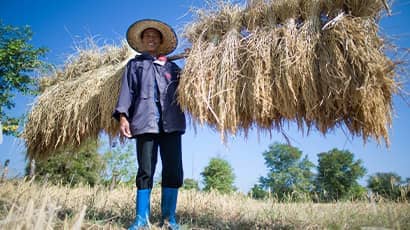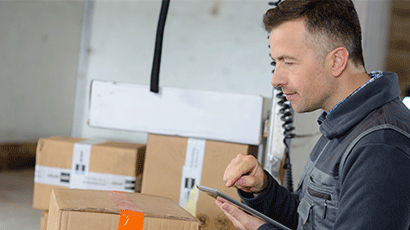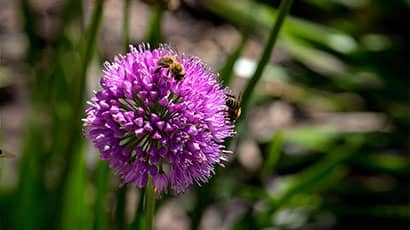Fairtrade facts and benefits
What is Fairtrade?
Fairtrade works with farming co-operatives, businesses and governments to make trade fairer.
Together with Fairtrade, farmers and workers have a vision: a world in which trade is based on fairness so that producers earn secure and sustainable livelihoods.
Fairtrade has a network of dedicated supporters, including UWE Bristol, who help to raise awareness of the issues of unfair trade.
Fairtrade standards
To guarantee that Fairtrade standards have been met, FLOCERT, an independent organisation, carries out checks and accredits the products with the Fairtrade logo.
Learn more about what Fairtrade does"Our mission is to connect disadvantaged farmers and workers with consumers, promote fairer trading conditions, and empower farmers and workers to combat poverty, strengthen their position and take more control over their lives."
Fairtrade Foundation 2020
How does Fairtrade work?
The scheme works to ensure that commercial companies pay a minimum stable fair price for products. This enables producers to plan, improve their businesses, develop skills and increasingly, adapt to climate change. As part of the scheme, Fairtrade provides a social premium, life transforming funds to benefit the community through schools, roads, health clinics, and more.
What is the Fairtrade minimum price?
The Fairtrade minimum price defines the lowest possible price that a buyer of Fairtrade products must pay the producer. The minimum price is set based on a consultative process with Fairtrade farmers, workers and traders and guarantees that producer groups receive a price which covers what it costs them to grow their crop. When the market price is higher than the Fairtrade minimum price, the trader must pay the market price.
Where can I buy Fairtrade products?
Buying Fairtrade is easy. You’ll find Fairtrade products in all main supermarkets (in particular the Co-op sells Fairtrade goods at the same price as its own brand), independent shops, cafés, restaurants, through catering suppliers and wholesales, as well as online. Also check out shops that are part of the British Association of Fair Trade Shops (BAFTS) which often have product ranges not available in mainstream stores.
How is the international Fairtrade system governed?
Members of the international Fairtrade system meet once a year at the General Assembly. In a recent initiative to shift power to producers and farmers, this assembly combines 50 percent producer representation with 50 percent national Fairtrade organization representation, and decides on membership issues, approves the annual accounts, and ratifies new board members.
Fairtrade facts and benefits
Fairtrade delivers many benefits to producers and consumers around the globe, here are some facts and figures from The Fairtrade Foundation.
- The Fairtrade system currently works with over 2 million farmers and workers.
- There are more than 1,900 Fairtrade producer organisations across 70 countries.
- Over 25% of all Fairtrade farmers and workers are women and Fairtrade Standards are designed to ensure gender equality and increase female participation.
- Environmental protection is ingrained in Fairtrade: farmers have to improve soil and water quality, manage pests, avoid using harmful chemicals, manage waste, reduce their greenhouse gas emissions and protect biodiversity.
- 77% of UK consumers say that they choose Fairtrade products over an alternative. There are over 6,000 products in the UK alone and one in three bananas sold here are Fairtrade.
The difference that Fairtrade makes
Economic benefits
- The Fairtrade Minimum Price is supporting the farmers that grow products such as cocoa, coffee and bananas to become more income-secure and less vulnerable to poverty.
- Fairtrade is gradually empowering communities to organise into cooperatives and improve their negotiating position within the supply chain. This can enable them to negotiate a higher price for their product than the conventional market price.
- Fairtrade improves access to agricultural services like organic training and premium markets. As a result, farmers have an incentive to farm better and sell more.
- Additional income through the Fairtrade Premium is supporting better farming, strong cooperatives and investment in collective assets to improve crops and yields.
Environmental benefits
- The Fairtrade Standards cover key areas for environmental protection, including energy and greenhouse gas emission reduction, soil and water quality, pest management, biodiversity protection, prohibition of genetically modified organisms and harmful chemicals, and waste management.
- The Fairtrade Standards promote training for farmers, which can include advice on switching to environmentally friendly practices, such as developing nutrient-rich soils that support healthy plants and encouraging wildlife to help control pests and diseases.
- For some farmers, the Fairtrade (and organic) Standards have resulted in switches to less toxic pesticides, which, as well as being better for the environment, have a positive impact on producers’ health.
- Fairtrade can provide access to finance, support, and expertise in tackling climate change, supporting long-term environmental sustainability.
Social benefits
- Farmers and workers who choose to participate in Fairtrade often feel a real sense of control over their future with greater power and voice.
- Fairtrade can support workers to realise their rights and negotiate the terms and conditions of their work through trade unions and collective bargaining.
- Fairtrade can provide producer support and expertise in deepening gender equality.
- For workers employed on Fairtrade certified plantations, investment of the Fairtrade Premium into education, better housing, better schools, and medical facilities is highly valued.
- Investment of the Fairtrade Premium by co-operatives in community development projects is improving the quality of life of rural communities.
- Achieving development impact is a long-term process and results vary significantly based on regional context, product, supply chain specifics, and external factors.
Fairtrade and UWE Bristol
We know that Fairtrade makes the University a better place in so many ways:
- It connects students and staff with the wider world and issues of social and climate justice and raises awareness of their responsibilities as global citizens. It really does provide a practical illustration of 'Good Economics', one of the 17 UN Sustainable Development Goals 2030, to which UWE Bristol is a signatory.
- For students, staff and visitors, our support of Fairtrade makes the University feel like a place people want to study work and visit. Put simply, they feel that it is a good thing to do!
- Fairtrade helps our Hospitality and Procurement teams to meet their Sustainability Plan targets for ethical purchasing, and similarly the Students' Union at UWE to meet the demands for ethical products from our students.
- Fairtrade provides a powerful and multi-faceted subject for learning and teaching, and helps us to influence the higher education sector as a whole through the Environmental Association of Universities and Colleges.
Fairtrade progress
Find out about UWE Bristol Fairtrade progress and best practice.
UWE Bristol Fairtrade progressContact us
Contact the Sustainability Team or The Students' Union at UWE Green Team if you have any queries or are interested in doing a Fairtrade study project.
You may also be interested in

UWE Bristol Fairtrade progress and best practice
Information on UWE Bristol's commitment to Fairtrade and the progress we have made over recent years.

Sustainable food
We are committed to providing high-quality sustainable food across our three campuses.

Sustainable purchasing and procurement
Details of our strategy to deliver sustainable procurement and address our suppliers' emissions, as outlined in our Responsible Procurement ESG policy.

Sustainability at UWE Bristol
Sustainability is embedded in our culture, research and teaching. We have already invested heavily in campus improvements and new technology, with plans underway to be carbon neutral by 2030.
